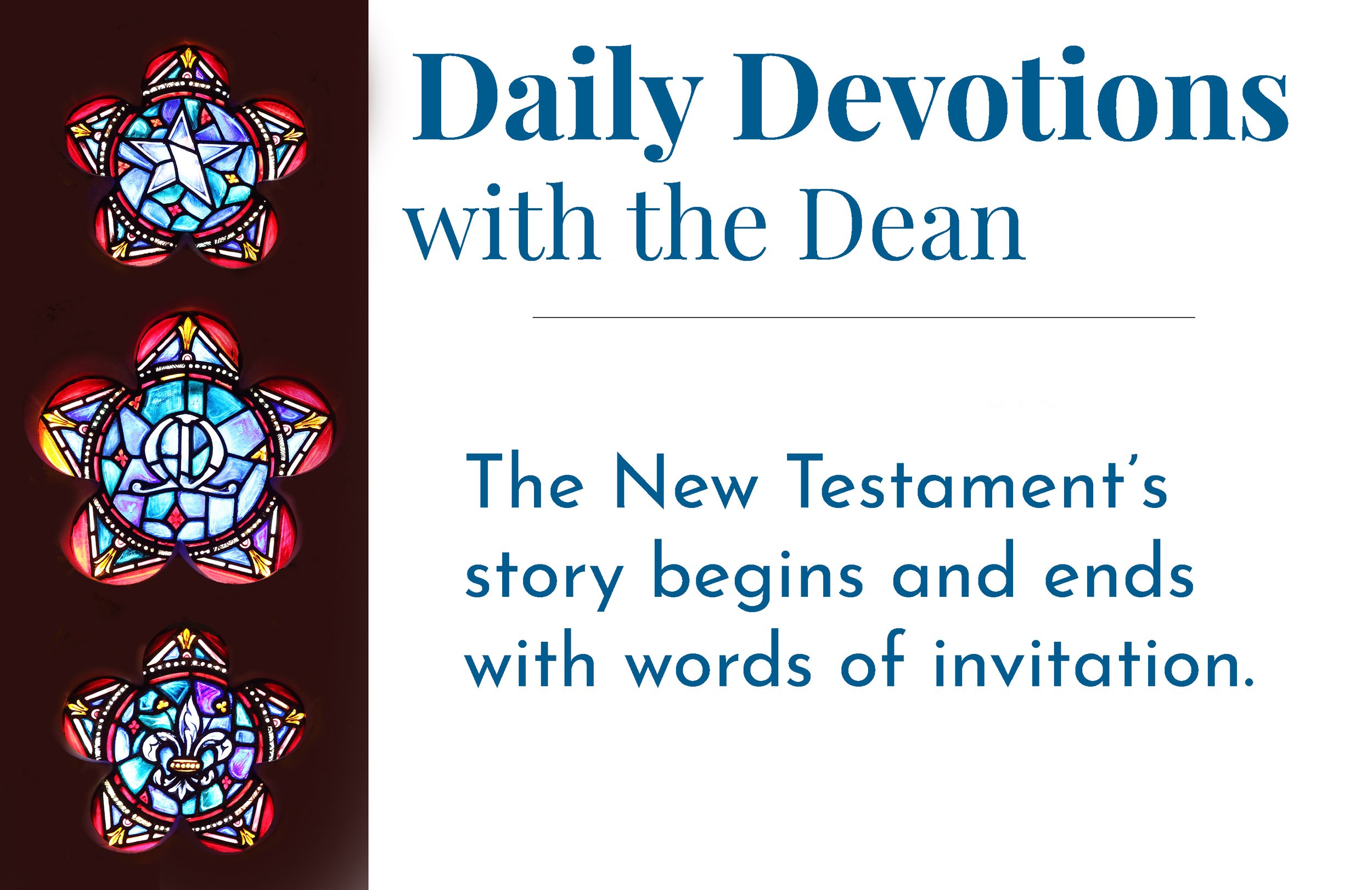Tuesday • 1/3/2023 •
This morning’s Scriptures are: Psalm 117; Psalm 118; Isaiah 59:15–21; Revelation 2:8–17; John 4:46–54
This morning’s Canticles are: following the OT reading, Canticle 10 (“The Second Song of Isaiah,” Isaiah 55:6–11; BCP, p. 86); following the Epistle reading, Canticle 18 (“A Song to the Lamb,” Revelation 4:11; 5:9–10, 13, BCP, p. 93)
Welcome to Daily Office Devotions, where every Monday through Friday we draw insights from that day’s Scripture readings, as given in the Book of Common Prayer. I’m Reggie Kidd, and I’m grateful to be with you this Tuesday of the week in which Epiphany takes place, 13 days after Christmas, on January 6. Today, I happen to be contemplating passages that are normally read on January 8, two days after Epiphany: Isaiah 59:15–21; Revelation 2:8–17; and John 4:46–54.
John: an Epiphany of healing words. The “second sign” that Jesus performs in John’s Gospel manifests (we are talking about the season of Epiphany, after all!) the power of his spoken word. The Word became flesh, and the very words of that Word restore life. Jesus does not even have to go to the place where this dying son of a royal official lies. “Go; your son will live,” and it’s done. The boy begins to recover at that very hour. As a result, the father and his whole household believe in Jesus. The words that come from the Word create their own world of hope and life.
Isaiah: an Epiphany of covenant words. Into his own world in which “truth is lacking,” Isaiah speaks on behalf of the Word who will centuries after him be manifest in the flesh. Where there is no truth, Isaiah says, there is no justice. The doing of right doesn’t exist in a world without truth: “Truth is lacking, and whoever turns from evil is despoiled. The Lord saw it, and it displeased him that there was no justice” (Isaiah 59:15). Where there is no truth there is no standard of right and wrong; only personal whim and tribal interests. Isaiah would be quite familiar with a world like ours, a world in which you choose your news network depending on what you want the news to say!
Isaiah counters with the power of God’s own words. Into the prophet’s mouth God places words from the Spirit—words that enforce the irrevocable covenant that God has made with his people and anticipate God’s own intervention. Words insisting that God is not aloof and uncaring: “He … was appalled that there was no one to intervene” (Isaiah 59:16a). Words promising that God himself will personally enter the fray against evil and for the good (which he literally did in the incarnation of his Son): “[H]is own arm brought him victory … He put on righteousness like a breastplate, and a helmet of salvation on his head” (Isaiah 59:16b–17). Words demand a hearing: “[M]y words that I have put in your mouth, shall not depart out of your mouth … from now on and forever” (Isaiah 59:21). You and I need not—indeed, dare not—let ourselves be led around by self- and tribe-serving truth-spinners, but by God’s own Word and the Spirit of discernment.
Revelation: an Epiphany of sustaining words. The Word’s words were spoken ahead of time through Isaiah. They came from his flesh and blood lips when he walked the earth. And in the Book of Revelation, the Word speaks from on high, as the “first and the last, who was dead and came to life” (Revelation 2:8). The words that Jesus speaks as ascended Lord give believers in Smyrna the power to endure intense trials—even unto death at the hands of those who should know better (members of the parent faith whose resistance to Jesus as Messiah has turned devilishly deadly—Revelation 2:9–11). Lord, have mercy!
And if we listen closely enough despite whatever confusion surrounds us (in Pergamum, pagan-influenced heresy and debauchery were being promoted in the church! Like that would never happen now, right!?), we can hear Jesus whisper the “new name”—the new identity—he gives to each of us personally and intimately: “To everyone who conquers I will give some of the hidden manna, and I will give a white stone, and on the white stone is written a new name that no one knows except the one who receives it” (Revelation 2:17).
Be blessed this day,
Reggie Kidd+













